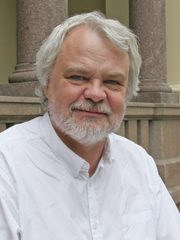Alumni Spotlight: Eyjólfur Kjalar Emilsson

Eyjólfur K. Emilsson believes that we have much to learn from the ancient thinkers. Especially concerning happiness and public policy-making.
Emilsson is one of the participants in the new research project Modeling Human Happiness at UiO that recently received funding (Large-scale Interdisciplinary Researcher Project) from the Research Council of Norway. The project will investigate what creates human happiness and how ancient ideas can help us make new models and explanations of human happiness.
We spoke with the professor about this new project and his time at CAS as a project leader.
 Back in 2009-10 you led the CAS project Ethics in Antiquity: The Quest for the Good Life together with your colleague Øivind Andersen. What do you remember best from your stay at CAS?
Back in 2009-10 you led the CAS project Ethics in Antiquity: The Quest for the Good Life together with your colleague Øivind Andersen. What do you remember best from your stay at CAS?

No particular event sticks out, but I remember very well the general feeling of being taken care of, of staff eager to make the group’s stay fruitful and pleasant. For me personally the time at CAS marked the beginning of a research interest—on the relationship between happiness and time—that has stuck with me and I hope to resume more actively soon.
In what way, if any, did the year at CAS affect your research career?
Several of us in the CAS project felt afterwards that even if we had learnt a lot we had merely scratched the surface of the subject. In direct continuation of the results and inspiration at CAS we developed new applications for even bigger projects, at UiO, the Research Council of Norway and the European Research Council, still with ancient thought at the centre. Until now, none of these came quite through but still finished high enough to entitle us to financial support to continue.
You are a member of the new research project Modeling Human Happiness that recently received funding from the Research Council of Norway. In what way is your research from CAS relevant to this project?
It is very relevant for me personally, since I see now the opportunity to resume more actively the topic I mentioned above—the relationship between happiness and time. Even if the new project is quite different, with more of a contemporary focus, it builds in many ways on the CAS project—we might describe it as its grandchild, having the old genes but also a lot of new ones.
The goal of the project is to develop innovative scientific models of happiness for use in research, public debate and policy-making. How will you contribute to this with your expertise on ethics in antiquity?
The ancient thinkers generally assumed that happiness is a normative, i.e. value-laden notion. I believe that our notion of happiness also is value-laden—you cannot describe happiness without a value concept. It strikes me and the other participants in the Modeling Human Happiness project that contemporary research on happiness as well as public policy-making tend to ignore this. In this area and indeed others, the ancient thinkers have something to teach us.
What advice would you give to future CAS project leaders?
I do not really know if I have any very useful advice. I might remind them of what they probably already know: that time at CAS flies. So be fully active all the time!
- This interview was first published in our monthly newsletter. Sign up here.